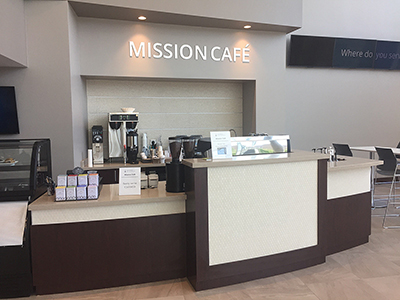
By Mike Bacile
There are many tangible elements that go into the making of a successful church café. You need the right look. Proper layout and flow are a must. The wrong equipment, menu or products can spell disaster.
But, even if you can achieve all these elements (as needed for a smooth-running, efficient café), you’ll still need one intangible element to succeed: a purpose.
When we meet with clients, we always ask the big questions first:
• Why are you building this café?
• What is your Vision?
• What is the café’s Purpose?
• What does success look like for your church café?
There are several key reasons to build a café, but the most important reason we’ve found is that the café must have a purpose that speaks to your community. Your café needs to inspire your volunteers — and your community that will be supporting it — or it won’t be successful for very long.
Admittedly, this is the driving vision for The Daily Java, as well: we see the difference a café with a purpose can make in a community. It brings people together, and it creates fellowship and profits that can support the purpose. Churches that are able to connect the purpose of the café with the purpose of the church are the most profitable, in terms of community and revenue.

Where purpose meets profits
One great example of this is a church that was committed to building wells in Africa. It was something the church was already doing, but leaders felt the profits from a café could help them achieve their goals faster.
What they didn’t anticipate was the community’s reaction. The church opened its café with a goal counter hanging on the back wall, above the menus. Instead of reading “Now Serving: ___,” it read: “Wells Provided: ___.”
It was amazing how the community and volunteers rallied around this purpose. The café was no longer a place for lattes and muffins; it was a vehicle to building more wells. Every week, everyone was looking to see if the counter had flipped to the next number. The volunteers working the café had a purpose: to make sure they did the best they could. The community was willing to wait in a longer line and make the church café their breakfast or coffee stop, because everyone understands that they’re all working towards a greater cause that makes a difference in people’s lives. Their latte was no longer just a $4 drink; rather, it was a donation that put the church one step closer to digging another well and changing an entire community in Africa. The pastor has done an amazing job of promoting and preaching their purpose as a community, and it shows in the number of wells they’re digging every month.
Connect with us at WFX 2017 in Dallas!
On October 11 – 12, The Daily Java will be exhibiting at the WFX Conference and Expo. Stop by and say hello! We’ll also be leading a breakout session, “Creating a Café of Purpose.” If you’re on hand, please plan to join us.
This is just one example of the success a café can enjoy when it’s given a purpose which volunteers and the community can really support. I always open my

volunteer trainings with an important truth: You might think you’re working a café. In reality, you’re changing the world.
Your café volunteers are the front line to understanding; each drink, each muffin, each person — all are an opportunity to make an impact on your café’s purpose. When volunteers understand this, you will have a much larger volunteer base and a much more connected community.
Find your café’s purpose
If that purpose is mission trips, make sure it’s specific trips each month, not a broad vision. If the trip to Guatemala is coming up in October, and your church is raising funds that will buy books for the students in a village, make that the purpose.
People in your community want to give. They want to support your vision and purpose. They just need you to connect the dots and create a specific purpose for them to embrace.
At the end of the day, when the mission trip is over and your community is celebrating the success, this gives everyone an opportunity to know they gave and made a difference — no matter how small — simply by purchasing a cup of coffee.
Mike Bacile is owner of The Daily Java, a wholesale coffee equipment and product provider for more than 21 years. He speaks at many conventions around the country about the 25 steps for setting up a successful café. Over the past decade, Bacile’s company has focused on making church cafés a successful part of their communities, and The Daily java has been labelled the “church coffee house experts.”


